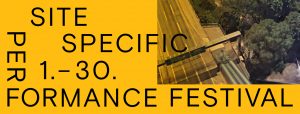
press echo
Here you can download the complete press review
“The goal is similar (to the Wiesbaden Biennale): to stimulate discourse, preferably not only among participating actors. But the young resident artists of IMPLANTIEREN see themselves as explorers of their own environment, or as quiet disruptors of the cityscape. For weeks on end, they sit down next to the regulars at Wasserhäusschen or make art in the S-Bahn. In this way, the eyes are to be directed to what we could have seen long ago…. . Does art in public space have to bang? Or rather creep up gently?” Eva-Maria Magel, “Magel strays,” Frankfurter Allgemeine Zeitung, Aug. 30, 2018
“The artistic directors and organizers of the festival, Hanna Knell and Eleonora Herder, are concerned with making the independent scene visible outside of established institutions. “There is such a big independent scene in Frankfurt and the surrounding area,” says Hanna Knell. “And only a very small part of it finds space in established institutions, such as the Mousonturm,” she says. Structurally, they deal with alternative production methods. In terms of content, the two organizers of the festival are concerned with the local scene and questions about urbanity: How can we live together in these conurbations? What discourses are there? The two want to establish Implant as a biennial festival of the independent scene. “In almost all German metropolises there are such festivals on the independent scene. Just not in Frankfurt,” says Hanna Knell.”
Tamara Marszalkowski, “Implanting Art,” Journal Frankfurt, September 2018
Your own city as a stage: IMPLANTIEREN 2018 aims and intends to give performing artists more visibility beyond established venues, to forge new alliances and facilitate encounters. “Vibrant urbanity only arises where different ways of living, feeling, perceiving and thinking intersect and these encounters and experiences of difference shape and change the individual but also the city,” say the organizers from ID_Frankfurt e.V.
founded in 2009.Focus. de, 23.08.2018
OF Project:
“Not alone immersed in listening and encapsulated, but with open ears, the walk in the darkness led across the city from the harbor via the marketplace to a street intersection in Offenbach’s east. In between, there were small theatrical interventions in backyards or in the middle of an intersection.”
David Rittershausen, “Under the Pavement the Beach. Implanting festival invites you to wander.”, Frankfurt Allgemeine Zeitung, Sept. 12, 2018
What do you think about the current urban development? It’s not about us. We are not opinion leaders and we go into conversations with people neutrally. Of course we know the master plan and also the changes in the past. Our goal is to make individual stories of Offenbachers visible.
Steffen Müller, “Declaration of Love for Offenbach. OF project* combines art and urban development,” Op-Online, 06/16/2018
Lichenology:
“Particularly worthy of protection, it was learned, is a rare lichen that occurs in the core area of the dune. Radek takes this natural space, which has been shaped by man, as an opportunity to reflect on the relationship between man and nature or even on the exemplary character of lichens for social utopias. Radek has combined the local and natural history information, as well as some philosophical thoughts, into a well-made feature.”
David Rittershausen, “Under the Pavement the Beach. Implanting festival invites you to wander.”, Frankfurt Allgemeine Zeitung, Sept. 12, 2018
Water cottage:
“Jörg Thums and the performance collective redpark want to free Frankfurt’s drinking halls from their liquor bottle image and conceive of them as symbolic water level indicators. For the Frankfurt Festival Implantieren, they will survey regulars of drinking halls about the general state of society, collect their assessments as messages in bottles, and present them in a special happening.”
SWR2- Kultur, 3.9.2018, 3:23 minutes
The process:
“Strangers keep getting on the bus, joining in the conversations. They also get to decide where Musti should go. It is fascinating how quickly the passengers open up. They immediately talk about their lives, about what moves them. Blawert and Korfhage listen and ask questions. It’s exactly what they want. To generate dialogue, to draw people out of anonymity.”
Theresa Weiß, The Art of Procedure, Frankfurter Allgemeine Zeitung, Sept. 17, 2018
Homo Mutans:
“The performance references the life and work of behavioral scientist Charlotte Bach, who supposedly not only wanted to reject Darwin, but whose basic thesis was that the evolution and creativity of creatures is based on the urge to change sex. Not exactly the state of the art in research, as Senckenberg is also doing. But especially among the museum’s meticulously documented finds and findings, the dazzling life and goings-on of Charlotte Bach is a fine play on certainties.”
Eva-Maria Magel, “Who was Charlotte Bach? With implants on false trails in the museum,” Frankfurt Allgemeine Zeitung, Sept. 15, 2018
“In front of the showcases with the preparations of the corresponding animals, one learns a lot of interesting facts about sex changes, hermaphrodites and virginity in the animal kingdom. The fact that the real clownfish, for example, is a frequent hermaphrodite is probably little known. This documentary-biographical theater has charm. One is a little wiser afterwards with regard to an interesting chapter far from the scientific mainstream.”
Stefan Michalzik, “A forgotten prophet of sexual diversity,” Frankfurter Rundschau, Sept. 19, 2018.
